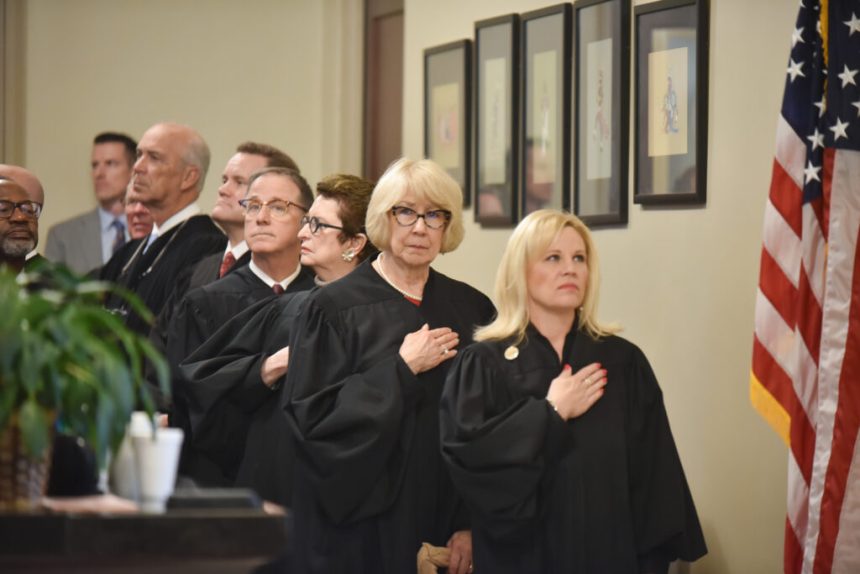Justices of the Oklahoma Supreme Court stand before entering the House chamber in the Oklahoma State Capitol for the governor’s State of the State Address on Feb. 5, 2024. (Photo by Kyle Phillips/For Oklahoma Voice)
OKLAHOMA CITY — Oklahoma’s Legislature acted unconstitutionally when it passed a new law creating business courts, the state’s highest court ruled.
The Oklahoma Supreme Court ruled 6-2 on Tuesday that the Legislature “exceeded the boundaries” of the state Constitution in part because lawmakers lack the authority to create a court system beyond the eight that already exist. The justices found that legislators attempted to create a special type of judge who is paid differently, has different terms and is exempt from voter scrutiny, an oversight power guaranteed to Oklahomans by the state Constitution.
Senate Bill 632 had sought to create business courts in Oklahoma City and Tulsa, but attorneys Joe E. White Jr. and Jason Waddell sued, questioning the constitutionality. They asked that the law be tossed out because business court judges would have been accountable only to the Legislature and the governor rather than to voters, which they contended was unconstitutional.
Supporters, including Gov. Kevin Stitt, had argued that the courts would help attract businesses to Oklahoma.
Stitt, House Speaker Kyle Hilbert, R-Bristow, and Senate President Pro Tem Lonnie Paxton, R-Tuttle, did not immediately comment on Wednesday. Hilbert and Paxton were the measure’s authors.
The Supreme Court ruled that adding a new court system would require a constitutional amendment. Judicial power is currently vested only in eight state courts — the Supreme Court, the Court of Criminal Appeals, the Court on the Judiciary, the State Industrial Court, the Court of Bank Review, the Court of Tax Review and district courts.
At one time the state Constitution allowed lawmakers the authority to create courts, but that power was abolished in 1967 as part of broader judicial reform effort, and the Legislature’s power was intentionally limited, according to the ruling, which was penned by Justice Noma Gurich.
The Constitution does not give lawmakers any authority to create new courts outside of “immediate appellate” and municipal courts, the justices found.
Gurich wrote that the “business court division” is part of the district court system, which means under the state Constitution those business court judges are essentially district court judges, who must be elected by voters in nonpartisan elections. SB 632 does not require the election of business court judges.
Under SB 632, business court judges would have been selected by the governor from a list of three candidates compiled by the House speaker. They would then be confirmed by the state Senate. A business court judge would be guaranteed an eight-year term with the possibility of being reappointed.
The law would circumvent the Judicial Nominating Commission, which currently recommends candidates to fill judicial vacancies. The commission submits judicial recommendations to the governor, who makes a selection from the list. Senate confirmation isn’t required, but voters later decide whether to retain those judges at the ballot box.
SB 632 also attempted to establish more stringent qualifications for business court judges, different pay and longer terms than the Oklahoma Constitution allows, the justices found.
Justices James Winchester, James Edmondson, Douglas Combs and Richard Darby concurred with the opinion. Chief Justice Dustin Rowe concurred, but dissented in part while Vice Chief Justice Dana Kuehn and Justice Travis Jett dissented.
SUBSCRIBE: GET THE MORNING HEADLINES DELIVERED TO YOUR INBOX









